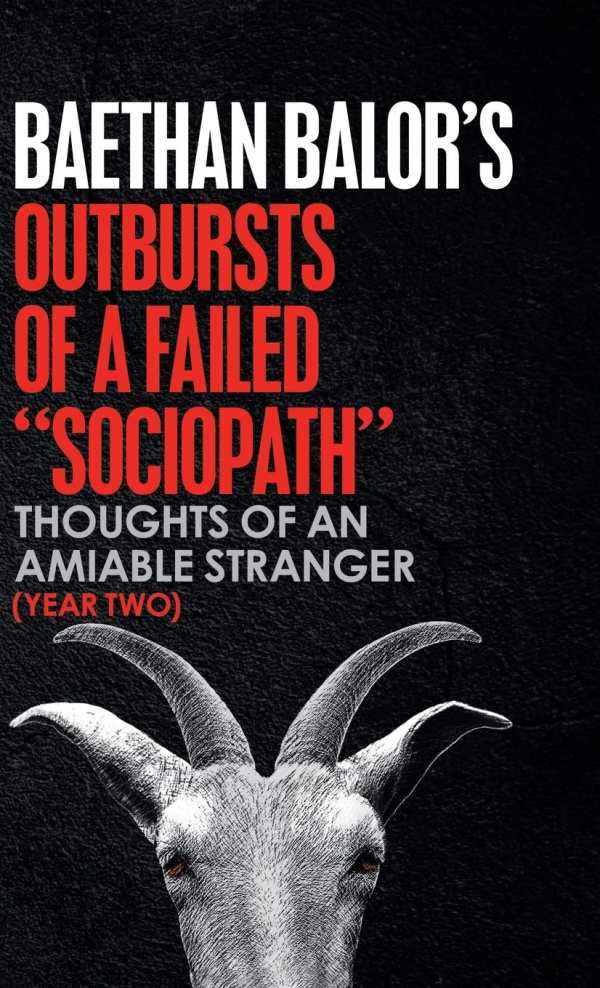Outbursts of a Failed Sociopath
Thoughts of an Amiable Stranger: Year Two
Outbursts of a Failed Sociopath is an unflattering, disturbing, and humorous memoir.
Baethan Balor’s second yearlong personal journal, Outbursts of a Failed Sociopath, chronicles the thoughts and misadventures of the self-proclaimed uncommon denizen.
As Balor turns twenty-six, he’s living with his father and working at a grocery store. Eager for change, he sells most of his possessions and moves to a commune. From there, he tries another intentional community; switches jobs several times; moves back in with his dad; and then moves out again. Throughout the year, he commits to a routine of reading, writing, abstinence, and physical upkeep.
Throughout, Balor records his thoughts for the sole purpose of collection, regarding them as objects: “I produce my words to be consumed by others. The thought transcends, stream of consciousness continues and the act of creation is rendered coherent by a perceiver.” The goal, or consequence, is to provide fodder for new thought.
Through its many styles of text, the book elicits a host of reactions. Sentence- to page-long stories are horrifying because of their gruesome images, while the included poems are amusing, and the shared grocery lists have a dulling effect. Balor expresses shocking feelings, like “I enjoy being a creep.” He also shares the entertaining observations of others and philosophical quotes for inspiration.
Because these candid entries run the gamut, the whole work does assume the flavor of a series of outbursts. Obsessions over people’s perceptions of Balor are common; he asks neighbors, so-called friends, and acquaintances whether or not they believe him to be a scoundrel and a loser, and he diagnoses himself as schizophrenic. Odd behavior is relayed that provokes reactions, as when Balor mows his father’s lawn in an Halloween costume to test perceptions against reality.
The text also suggests that Balor is provocatively indifferent toward himself. He responds to praise regarding his intelligence by criticizing flattery and declares that he’d rather identify as a fool. He proclaims himself a sociopath and a failure, but amiable; he resists friendships. He fulfills his life’s dream—to publish his work—while also warning his audience that it’s a waste of time to keep reading. His narration comes to serve as a lightning rod for the strong opinions he’s sure he’s bound to incite.
Grammatical mistakes and date mix-ups mar the text, whose tone is consistent and droll. Other characters intensify its mood: Balor’s father rails against tenants in the apartment complex he owns; his coworker gushes over him, and a benefactress dotes on him.
The book’s most satirical moments happen at the commune, called Peaceorama, where conversations are witty and terse. These entries are a welcome shift from the book’s streams of diatribe and self-loathing, which require patience to endure.
A plodding text without a climax, Outbursts of a Failed Sociopath is an unflattering, disturbing, and humorous memoir.
Reviewed by
Mari Carlson
Disclosure: This article is not an endorsement, but a review. The publisher of this book provided free copies of the book and paid a small fee to have their book reviewed by a professional reviewer. Foreword Reviews and Clarion Reviews make no guarantee that the publisher will receive a positive review. Foreword Magazine, Inc. is disclosing this in accordance with the Federal Trade Commission’s 16 CFR, Part 255.


